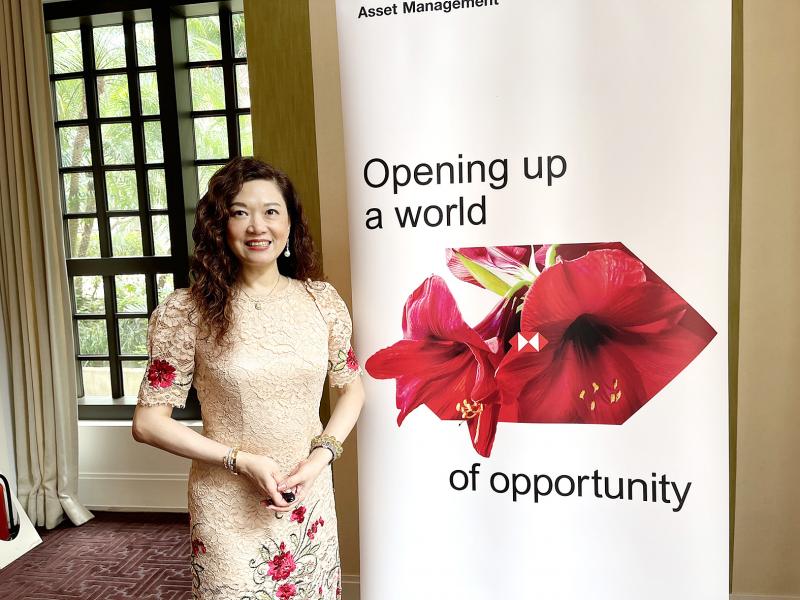HSBC Global Asset Management Taiwan Ltd (匯豐中華投信) is to grow local operations by expanding its management team and launching new funds by the end of this year, chief executive officer Chiao Hsin (焦訢) told a news conference in Taipei yesterday.
The asset management company has about 80 employees, and it would add five senior managers who would be in charge of portfolios and projects, Chiao said.
“The positions would be offered to local talent. We are already interviewing some candidates. It is possible that the positions would be filled in the third quarter,” Chiao said.

Photo: CNA
While it is uncommon for local asset management companies to expand their senior management teams, HSBC Global Asset Taiwan has been committed to deepening its local operations, she said.
The company would also ask for more resources from its parent company to enhance staff training, investment research, risk controls and product design to boost business in the local fund market, Chiao said.
“We have discussed with our overseas investment team the design of a new onshore fund that we plan to launch by the end of this year. We can bring a global perspective in fund design, as HSBC is an international group,” Chiao said.
The company would factor in rate hikes and inflation when it chooses investment targets, as both are expected to persist over the next few years, Chiao said.
The new fund would also have environmental, social and corporate governance (ESG) factors, and would comply with tighter rules that were announced by regulators in January, Chiao said.
While regulators have not specified the types of companies in which ESG-themed funds must not invest, HSBC Global Asset Taiwan would not invest in companies that make tobacco products or alcoholic beverages, or run gambling operations, she said.
“Besides those companies, we will not specifically select industries, as a company in an energy-consuming field could still perform well in ESG,” Chiao said.
MORE RESISTANT
ESG funds are more resistant to risks than other types of funds, as the companies that are chosen by such funds usually have two properties — great scale of operations and good cash flow, Chiao said.
The company has introduced 23 offshore funds to local investors, all of which meet the European Supervisory Authorities’ Sustainable Finance Disclosure Regulations, Chiao said.
Eight of the funds conform with Article 8 of the regulations, as the companies they invest follow good governance practices and can be called “light green funds,” she said.

‘SWASTICAR’: Tesla CEO Elon Musk’s close association with Donald Trump has prompted opponents to brand him a ‘Nazi’ and resulted in a dramatic drop in sales Demonstrators descended on Tesla Inc dealerships across the US, and in Europe and Canada on Saturday to protest company chief Elon Musk, who has amassed extraordinary power as a top adviser to US President Donald Trump. Waving signs with messages such as “Musk is stealing our money” and “Reclaim our country,” the protests largely took place peacefully following fiery episodes of vandalism on Tesla vehicles, dealerships and other facilities in recent weeks that US officials have denounced as terrorism. Hundreds rallied on Saturday outside the Tesla dealership in Manhattan. Some blasted Musk, the world’s richest man, while others demanded the shuttering of his

ADVERSARIES: The new list includes 11 entities in China and one in Taiwan, which is a local branch of Chinese cloud computing firm Inspur Group The US added dozens of entities to a trade blacklist on Tuesday, the US Department of Commerce said, in part to disrupt Beijing’s artificial intelligence (AI) and advanced computing capabilities. The action affects 80 entities from countries including China, the United Arab Emirates and Iran, with the commerce department citing their “activities contrary to US national security and foreign policy.” Those added to the “entity list” are restricted from obtaining US items and technologies without government authorization. “We will not allow adversaries to exploit American technology to bolster their own militaries and threaten American lives,” US Secretary of Commerce Howard Lutnick said. The entities

Minister of Finance Chuang Tsui-yun (莊翠雲) yesterday told lawmakers that she “would not speculate,” but a “response plan” has been prepared in case Taiwan is targeted by US President Donald Trump’s reciprocal tariffs, which are to be announced on Wednesday next week. The Trump administration, including US Secretary of the Treasury Scott Bessent, has said that much of the proposed reciprocal tariffs would focus on the 15 countries that have the highest trade surpluses with the US. Bessent has referred to those countries as the “dirty 15,” but has not named them. Last year, Taiwan’s US$73.9 billion trade surplus with the US

Prices of gasoline and diesel products at domestic gas stations are to fall NT$0.2 and NT$0.1 per liter respectively this week, even though international crude oil prices rose last week, CPC Corp, Taiwan (台灣中油) and Formosa Petrochemical Corp (台塑石化) said yesterday. International crude oil prices continued rising last week, as the US Energy Information Administration reported a larger-than-expected drop in US commercial crude oil inventories, CPC said in a statement. Based on the company’s floating oil price formula, the cost of crude oil rose 2.38 percent last week from a week earlier, it said. News that US President Donald Trump plans a “secondary